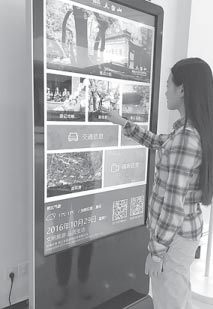 |
|
A tourist is searching information via a machine in Tiantai Mountains Scenic Area, Zhejiang province. [Photo provided to China Daily] |
Also, as China is their biggest international tourist market, they invited more than 600 Chinese bloggers to Thailand last year to share their travel experiences online.
Thailand also works with Chinese social media to do surveys on favorite things about Thailand among Chinese travelers. And it turns out that they like Chiang Mai the most as a destination and love durians and Thai-style crab preparations.
"Such information helps us target Chinese tourists, and make adjustments to meet their demands. Smart tourism helps us to understand each other more and stay connected," he says.
Song Fuhua, the chairman of Hangzhou-based Drore Information and Technology Co. Ltd., says the growing number of independent travelers in recent years has made scenic areas adopt smart services.
For instance, if visitors use e-tickets, it is convenient for them and saves manpower.
The company, which offers customized smart tourism solutions for Chinese scenic spots is seeing more business now.
For Song, smart tourism is like a tree, big data its roots, the software its trunk and the management and operations its branches.
"If a scenic spot's annual visitor numbers reach one million, it is more likely to invest in smart tourism, because this can lead visitors to spend more money rather than just buy tickets," he says.
Dimitrios Buhalis, the head of the Department of Tourism and Hospitality at Bournemouth University in the United Kingdom, agrees.
"With a big population and many destinations, China has a lot of big data being collected. Its smart cities and smart tourism are advanced," he says.
"But the issue is what do you do with the data. You can use the data to create opportunities for selling products that cater to customers' needs so as to enhance the visitor experience."
According to him, smart tourism also helps create products that are specific to tourists, so travelers get good value for their money and time.
"For instance, you will have different needs when you travel with your mother and kids. So, smart tourism is about contextualizing the experience to your needs."
|
|
|
|
|
|
|
|
